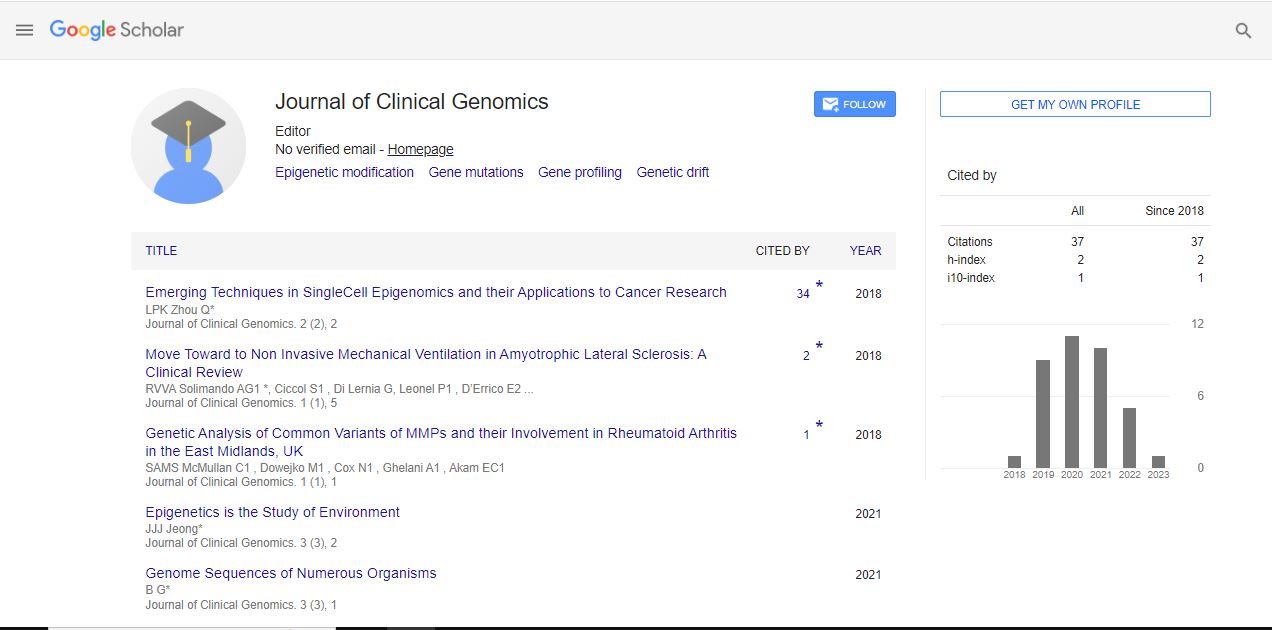Opinion Article, J Chromatography Res Vol: 6 Issue: 3
Recent Innovations and Emerging Trends in Supercritical Fluid Chromatography
Kumar Heselva*
1Department of Chemistry, University of Peradeniya, Peradeniya, Sri Lanka
*Corresponding Author: Kumar Heselva,
Department of Chemistry, University of
Peradeniya, Peradeniya, Sri Lanka
E-mail: heselvakumar@gmail.com
Received date: 05 September, 2023, Manuscript No. JCGR-23-116811;
Editor assigned date: 07 September, 2023, PreQC No. JCGR-23-116811 (PQ);
Reviewed date: 21 September, 2023, QC No. JCGR-23-116811;
Revised date: 29 September, 2023, Manuscript No. JCGR-23-116811 (R);
Published date: 06 October, 2023 DOI: 10.36648/JCGR.1000071.
Citation: Heselva K (2023) Recent Innovations and Emerging Trends in Supercritical Fluid Chromatography. J Chromatography Res 6:3.
Description
Supercritical Fluid Chromatography (SFC) is a powerful analytical technique that has gained significant attention and importance in recent years. This versatile separation method is known for its ability to handle a wide range of compounds and matrices. SFC utilizes supercritical fluids as the mobile phase, providing several advantages over conventional Liquid Chromatography (LC) and Gas Chromatography (GC).
Principles of supercritical fluid chromatography
SFC combines the principles of both GC and LC, making it a unique and efficient separation technique. The key principles of SFC include:
Supercritical fluids: Supercritical fluids are materials that exist in a state between a gas and a liquid when subjected to specific temperature and pressure conditions. The most commonly used supercritical fluid in SFC is Carbon Dioxide (CO2). Supercritical CO2 is non-polar, which makes it suitable for a wide range of analytes, and it can easily be adjusted to become more polar by adding a co-solvent.
Analyte interaction: Separation in SFC occurs primarily due to the differences in analyte interactions with the stationary phase. Typically, silica-based materials are used as the stationary phase, functionalized with various groups to control analyte retention and selectivity.
Elution process: The elution of analytes in SFC is achieved by varying pressure and temperature. Reducing pressure or increasing temperature will elute analytes from the column, similar to changing the mobile phase composition in traditional LC.
Instrumentation in supercritical fluid chromatography
SFC instrumentation has evolved over the years to meet the demands of modern analytical chemistry. Key components of an SFC system include:
Pumping system: SFC uses high-pressure pumps to deliver the supercritical fluid and co-solvent, if necessary, to the column. These pumps are capable of precise and reproducible flow rates.
Column: The SFC column is packed with stationary phase particles designed for efficient analyte separation. It is essential to choose the appropriate column for the specific analytes of interest.
Detectors: Various detectors can be used in SFC, including UVVis, evaporative light scattering and mass spectrometry detectors. Mass spectrometry has become particularly valuable in SFC due to its high sensitivity and selectivity.
Back Pressure Regulator (BPR): A BPR is essential in SFC to maintain the desired supercritical fluid density and, consequently, the separation quality.
Applications of supercritical fluid chromatography
SFC has gained widespread use in various scientific and industrial fields. Its applications include:
Pharmaceuticals: SFC is well-suited for the analysis of pharmaceutical compounds, especially chiral molecules. It is extensively used for drug discovery, quality control, and pharmacokinetics.
Natural products: SFC is ideal for the analysis of complex natural product extracts, making it valuable in food and herbal product industries.
Environmental analysis: SFC is used for the determination of environmental contaminants and pollutants in water, soil, and air samples.
Petrochemicals: SFC plays a crucial role in the petrochemical industry for the analysis of complex hydrocarbon mixtures.
Chiral separations: SFC is highly effective for chiral separations, where it has an advantage over other techniques due to its ability to separate enantiomers efficiently.
Lipidomics: SFC is increasingly used for the analysis of lipids in biological samples, contributing to advancements in lipidomics.
Recent advancements in supercritical fluid chromatography
Recent advancements have further enhanced the capabilities and versatility of SFC, expanding its applications and effectiveness. Some notable advancement includes:
Ultra-high-pressure SFC: Advances in pumping systems and columns have enabled ultra-high-pressure SFC, which provides higher efficiency and faster separations.
Online coupling with mass spectrometry: The combination of SFC with mass spectrometry has opened new possibilities for the analysis of a wide range of compounds, including highly polar and non-polar analytes.
Green SFC: Efforts to make SFC more environmentally friendly have led to the development of greener supercritical fluids and more sustainable processes.
Conclusion
Supercritical Fluid Chromatography has evolved into a versatile and indispensable analytical technique in modern analytical chemistry. Its ability to handle a broad range of analytes, including chiral compounds, complex natural products, and environmental contaminants, has made it a valuable tool in various industries and and scientific research. Recent advancements in SFC technology have improved its efficiency, speed, and selectivity, expanding its applications and making it an even more powerful analytical method. As analytical needs continue to evolve, SFC is likely to play an increasingly prominent role in addressing complex analytical challenges and driving scientific discoveries.
 Spanish
Spanish  Chinese
Chinese  Russian
Russian  German
German  French
French  Japanese
Japanese  Portuguese
Portuguese  Hindi
Hindi 